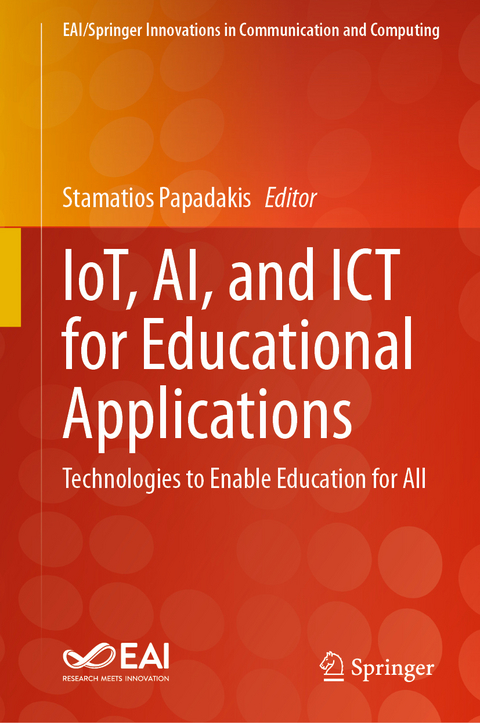
IoT, AI, and ICT for Educational Applications
Springer International Publishing (Verlag)
978-3-031-50138-8 (ISBN)
This book provides insight into the importance of advanced innovative technologies such as the Internet of Things (IoT), artificial intelligence (AI), and Metaverse as part of information and communication technology (ICT) solutions in education. Key features of this book include the recent and emerging developments in various specializations in education and finding their solutions by incorporating IoT, AI and ICT. This book presents useful applications, interventions, and case studies that cater to their improved requirements. Topics include formal and services based on IoT; AI technology for IoT-based educational delivery; interfacing devices to IoT; smart educational services; ChatGPT; Smartbots; and more. The authors include several practical solutions and applications of IoT and ICT in education. The book applies to researchers, academics, students, educators and practitioners around the world.
Dr. Stamatios Papadakis has been a postdoctoral researcher in Educational Technology, with an emphasis on mobile learning, at the Department of Preschool Education at the University of Crete, Greece, since 2016. He has worked in several international and national computational thinking and pedagogy projects for Pre-K to 16 Education. His scientific and research interests include the study of mobile learning, especially on using smart mobile devices and their accompanying mobile applications (apps) in Preschool and Primary Education, focusing on developing Computational Thinking and students' understanding of numbers. Furthermore, he currently investigates how a STEM learning approach influences learning achievement through a context-aware mobile learning environment in the preschool classroom and explain the effects on preschoolers' learning outcomes. He is an ambassador for Scientix - The Community for Science Education in Europe and EU Code Week. He is an ESERA member, CSTA, EAI, IGIP, and the Union for Science and Technology (ENEPHET). He has published in scientific peer-reviewed journals and international conferences (including Computers & Education, Education and Information Technologies, Early Childhood Education Journal) and book chapters.
Chapter 1. Examining the Validity and Reliability of the Teacher Self-Efficacy Scale in the Use of ICT at Home for Preschool Distance Education (TSES-ICT-PDE) among Greek Preschool Teachers: A Comparative Study with Turkey.- Chapter 2. Benefits, Challenges and Opportunities of Using Computer-Assisted Instruction in Mathematics Education.- Chapter 3. Exploring the Use of ChatGPT as a Tool for Developing Eportfolios in ESL Classrooms.- Chapter 4. Exploring the Use of Alexa as a Motivational Tool in English Language Learning Among EFL Students in Israel.- Chapter 5. Smart Education: Social risks and challenges.- Chapter 6. The Role of Computers in Education in the Era of the Fourth Industrial Revolution.- Chapter 7. Play, Code, Learn: Fostering Computational Thinking in Primary Aged Learners Through Interactive Play.- Chapter 8. Opinion of Spanish teachers about Artificial Intelligence and its use in education.- Chapter 9. School Leadership 4.0: Are we ready?.- Chapter 10. Harnessing thePower of Digital Resources in Mathematics Education: The Potential of Augmented Reality and Artificial Intelligence.- Chapter 11. ICT Use in Blog Design: A Study of Pre-service Preschool Teachers During Pandemic.
| Erscheinungsdatum | 20.01.2024 |
|---|---|
| Reihe/Serie | EAI/Springer Innovations in Communication and Computing |
| Zusatzinfo | XVI, 249 p. 40 illus., 36 illus. in color. |
| Verlagsort | Cham |
| Sprache | englisch |
| Maße | 155 x 235 mm |
| Gewicht | 559 g |
| Themenwelt | Technik ► Elektrotechnik / Energietechnik |
| Technik ► Nachrichtentechnik | |
| Schlagworte | adaptive technologies • Artificial Intelligence in Education • Critical theories and computing • educational data mining • Educational robot • Emotional intelligence and computing • future education • Humanist learning theories • Learning Analytics • Meta-learning |
| ISBN-10 | 3-031-50138-1 / 3031501381 |
| ISBN-13 | 978-3-031-50138-8 / 9783031501388 |
| Zustand | Neuware |
| Haben Sie eine Frage zum Produkt? |
aus dem Bereich


